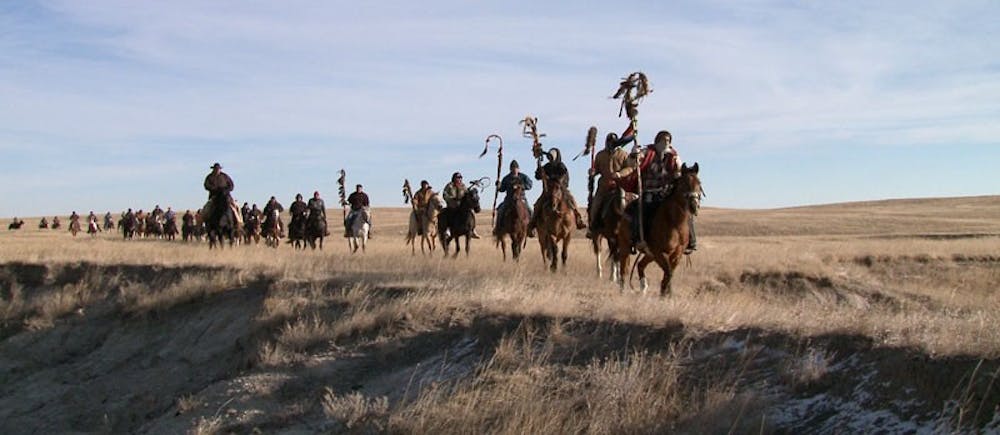Director Stéphanie Gillard is visiting Richmond from Paris for the whole week to speak at the 25th anniversary of the French Film Festival. On Monday, March 27, she gave a speech entitled "Reframing Cultural Survivance" about her time with the Lakota tribe.
I sat down with Gillard, whose documentary of her adventure with the tribe is being shown at this year's French Film Festival, to talk about her experience as she filmed the 300-mile horseback journey the Lakota (Sioux) tribe takes every year to commemorate the Wounded Knee Massacre.
The Wounded Knee Massacre occurred on Dec. 28, 1890, on the Lakota Pine Ridge Reservation in South Dakota. There was a disagreement between U.S. troops and the tribe that led to a battle in which about 150 Lakota members were killed.
To commemorate the deaths from the massacre, a group called "The Big Foot Memorial Riders" began this horseback ride in 1986. The riders carry a flag to symbolize their hope for peace and to remember those who they lost.
Q: How did you initially get the idea to film the tribe and make a documentary about the ride?
A: I was inspired by the book "On the Trail to the Wounded Knee: The Big Foot Ride" and learned about this trip that is done every year. I first wanted to go on the trip myself to see if there was a movie to write and get to know the people. I was also inspired by Jim Harrison's book "Delva" because it talks about how there is history and stories in the middle of the country that people forget about.
Q: How was being with the tribe and getting to know them?
A: It was hard. I am shy. My way was to ask stupid questions, but at least the fact that you ask them shows interest. They always have the feeling that people know everything about them, but they don't. They like if you try to understand them instead of saying, "I know, I know."
At first, they would make lots of jokes and tease me, but it is in the Lakota nature to joke. Once I got used to it and figured out how to navigate the tribe, they were more open. I would help them cook and play with the kids, which showed them that I was interested in helping and not just watching them.
Q: Did you have to learn to ride horseback for the trip?
A: To be honest, before my first year I took one week of horseback riding classes because I was pretty sure they were going to make me ride a horse. They told me when we arrived the first year that we would learn on the ride.
Enjoy what you're reading?
Signup for our newsletter
Q: How many times have you been on the trip and how long is it?
A: The trip lasts 12 days. I rode it two years in a row, then filmed my third year [in 2011]. I came back and rode my fourth, skipped my fifth and rode my sixth year. I have to admit, the ride is actually really difficult, and the group that I was getting along with isn't going anymore, so I would rather go visit them at different times.
Q: How many hours a day would you normally ride?
A: Depends. Some days [there were] three to four hours of riding, but usually six to seven. Sometimes you wanted to stop, but no.
Q: What was the hardest part about filming in this setting?
A: It is a huge group, so it is really complicated to deal with the horses. Sometimes there is a horse going across when you don't want, or a truck stopping right by you. You can't ask people to move. The way I film, I never ask people to do something for the camera. It is really difficult.
Q: You have made several documentaries now, have you ever thought about writing scripted movies?
A: I can't invent stories, so I always do a story that already exists. I tried, but it is not my stuff.
Gillard's movie "The Ride" will be showing at the Byrd Theater on Wednesday, March 29 at 8 p.m.
Contact reporter Julia Muro at julia.muro@richmond.edu.
Support independent student media
You can make a tax-deductible donation by clicking the button below, which takes you to our secure PayPal account. The page is set up to receive contributions in whatever amount you designate. We look forward to using the money we raise to further our mission of providing honest and accurate information to students, faculty, staff, alumni and others in the general public.
Donate Now



